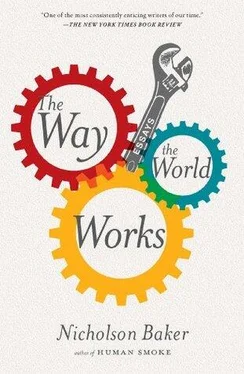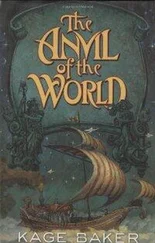Nicholson Baker - The Way the World Works
Здесь есть возможность читать онлайн «Nicholson Baker - The Way the World Works» весь текст электронной книги совершенно бесплатно (целиком полную версию без сокращений). В некоторых случаях можно слушать аудио, скачать через торрент в формате fb2 и присутствует краткое содержание. Год выпуска: 2012, Издательство: Simon & Schuster, Жанр: Публицистика, Критика, на английском языке. Описание произведения, (предисловие) а так же отзывы посетителей доступны на портале библиотеки ЛибКат.
- Название:The Way the World Works
- Автор:
- Издательство:Simon & Schuster
- Жанр:
- Год:2012
- ISBN:нет данных
- Рейтинг книги:4 / 5. Голосов: 1
-
Избранное:Добавить в избранное
- Отзывы:
-
Ваша оценка:
- 80
- 1
- 2
- 3
- 4
- 5
The Way the World Works: краткое содержание, описание и аннотация
Предлагаем к чтению аннотацию, описание, краткое содержание или предисловие (зависит от того, что написал сам автор книги «The Way the World Works»). Если вы не нашли необходимую информацию о книге — напишите в комментариях, мы постараемся отыскать её.
), here assembles his best short pieces from the last fifteen years.
The Way the World Works
OED
Modern Warfare 2
Through all these pieces, many written for
, and
, Baker shines the light of an inexpugnable curiosity.
is a keen-minded, generous-spirited compendium by a modern American master.
The Way the World Works — читать онлайн бесплатно полную книгу (весь текст) целиком
Ниже представлен текст книги, разбитый по страницам. Система сохранения места последней прочитанной страницы, позволяет с удобством читать онлайн бесплатно книгу «The Way the World Works», без необходимости каждый раз заново искать на чём Вы остановились. Поставьте закладку, и сможете в любой момент перейти на страницу, на которой закончили чтение.
Интервал:
Закладка:
Wait. What real value? Come now, my prominent executive friend. Have you not glanced at Street View in Google Maps? Have you not relied on the humble aid of the search-box calculator, or checked out Google’s movie showtimes, or marveled at the quick-and-dirtiness of Google Translate? Have you not made interesting recherché nineteenth-century discoveries in Google Books? Or played with the amazing expando-charts in Google Finance? Have you not designed a strange tall house in Google SketchUp, and did you not make a sudden cry of awed delight the first time you saw the planet begin to turn and loom closer in Google Earth? Are you not signed up for automatic Google News alerts on several topics? I would be very surprised if you are not signed up for a Google alert or two. Surely no other software company has built a cluster of products that are anywhere near as cleverly engineered, as quick-loading, and as fun to fiddle with as Google has, all for free. Have you not searched ?
Because, let me tell you, I remember the old days, the antegoogluvian era. It was okay — it wasn’t horrible by any means. There were cordless telephones, and people wore comfortable sweaters. There was AltaVista, and Ask Jeeves, and HotBot, and Excite, and Infoseek, and Northern Light — with its deep results and its elegant floating schooner logo — and if you wanted to drag through several oceans at once, there was MetaCrawler. But the haul was haphazard, and it came in slow. You chewed your peanut-butter cracker, waiting for the screen to fill.
Then Google arrived in 1998, sponged clean, impossibly fast. Google was like a sunlit white Formica countertop with a single vine-ripened tomato on it. No ads in sight — Google was anti-ad back then. It was weirdly smart, too; you almost never had a false hit. You didn’t have to know anything about the two graduate students who had aligned and tuned their secret algorithms — the inseparable Page and Brin — to sense that they were brilliant young software dudes, with all the sneakered sure-footedness of innocence: the “I’m Feeling Lucky” button in that broad blank expanse of screen space made that clear. Google would make us all lucky; that was the promise. And, in fact, it did.
So why are the prominent media executives unhappy? Because Google is making lots of ad money, and there’s only so much ad money to go around. Last year almost all of Google’s revenue came from the one truly annoying thing that the company is responsible for: tiny, cheesy, three-line text advertisements. These AdWords or AdSense ads load fast, and they’re supposedly “polite,” in that they don’t flicker or have pop-ups, and they’re almost everywhere now — on high-traffic destinations like the Washington Post or MySpace or Discovery.com, and on hundreds of thousands of little websites and blogs as well. “It’s all of our revenue,” Larry Page said in a meeting that Auletta attended in 2007.
The headlines say things like “Laser Hair Removal,” “Christian Singles,” “Turn Traffic Into Money,” “Have You Been Injured?” “Belly Fat Diet Recipe,” “If U Can Blog U Can Earn,” “Are You Writing a Book?” and so on. Countless M.F.A., or Made for AdSense, websites have appeared; they use articles stolen or “scraped” or mashed together from sites like Wikipedia, and their edges are framed with Google’s text ads. The ads work on a cost-per-click scheme: the advertiser pays Google only if you actually click on the ad. If you do, he’s billed a quarter, or a dollar, or (for some sought-after keywords like “personal injury” or “mesothelioma lawyers”) ten dollars or more.
But think — when was the last time you clicked on a three-line text ad? Almost never? Me neither. And yet, in 2008, Google had $21.8 billion in revenue, about 95 percent of which flowed from AdWords/AdSense. (A trickle came from banner and video ads sold by Google’s new subsidiary DoubleClick, and from other products and services.) These unartful, hard-sell irritants — which have none of the beauty or the humor of TV, magazine, radio, or newspaper advertising — are the foundation of Google’s financial empire, if you can believe it. It’s an empire built on tiny grains of keyword-searchable sand.
The advertising revenue keeps Google’s stock high, and that allows the company to do whatever it feels like doing. In 2006, when Google’s stock was worth $132 billion, the company absorbed YouTube for $1.65 billion, almost with a shrug. “They can buy anything they want or lose money on anything they choose to,” Irwin Gotlieb, the chief of GroupM, one of Google’s biggest competitors in the media market, told Auletta. If Microsoft is courting DoubleClick, Google can swoop in and buy DoubleClick for $3.1 billion. If the business of cloud computing seems to hold great promise, Google can build twenty or fifty or seventy massive data centers in undisclosed locations around the world, each drawing enough power to light a small city. Earlier this month, Google announced it would pay $750 million in stock for a company called AdMob, to sell banner ads on cell phones. “Once you get to a certain size, you have to figure out new ways of growing,” Ivan Seidenberg, the chief executive of Verizon, said to Auletta. “And then you start leaking on everyone else’s industry.” That’s why Auletta’s CEOs are resentful.
True, the miracles keep coming: Google Voice, which can e-mail you a transcript of your voice mail messages; and Chrome, a quick, clever Web browser; and Android, the new operating system for mobile devices. One of the latest is an agreement to print books on an ATM-style on-demand printer, the Espresso Book Machine. But perhaps there are too many miracles emanating from one campus now; perhaps brand fatigue is setting in. Google’s famous slogan, “Don’t be evil,” now sounds a little bell-tollingly dystopian. When they were at Stanford, Page and Brin criticized search engines that had become too “advertising oriented.” “These guys were opposed to advertising,” Auletta quotes Ram Shriram, one of Google’s first investors, as saying. “They had a purist view of the world.” They aren’t opposed now. Now they must be forever finding forage for a hungry, $180 billion ad-maddened beast. Auletta describes an unusual job-interview test that Sergey Brin once gave to a prospective in-house lawyer: “I need you to draw me a contract,” Brin said to her. “I need the contract to be for me to sell my soul to the Devil.” That was in 2002, the year Google began work internally on what would become AdSense.
Now Page and Brin fly around in a customized Boeing 767 and talk sincerely about green computing, even as the free streamings of everyone’s home video clips on YouTube burn through mountaintops of coal. They haven’t figured out a way to “monetize”—that is, make a profit from — their money maelstrom YouTube, although I notice that Coffee-mate and Samsung banners appear nowadays in Philip DeFranco’s popular video monologues. “The benefit of free is that you get 100 percent of the market,” Eric Schmidt, Google’s chief executive, explained to Auletta. “Free is the right answer.” For a while, perhaps — but maybe free is unsustainable. For newspapers, Auletta writes, “free may be a death certificate.” Maybe in the end, even on the Internet, you get what you pay for.
(2009)
Steve Jobs
The other day, I ordered a new machine from Apple, and just before bed I went to the Apple website to check when it was going to ship. There, looking at me, instead of the normal welcome page announcing the latest mojo miracle of euphoric minimalism, was a man with round John Lennon glasses and an intense gaze and a close-cropped beard, photographed in black-and-white. It was Steve Jobs from some years ago, before he got sick. He looked like he wanted to tell me something, but I didn’t know what it was. To the left of the photograph, on this simple white screen — not an ounce of color on it anywhere — I saw his birth date: 1955. Then there was a hyphen, and then: 2011.
Читать дальшеИнтервал:
Закладка:
Похожие книги на «The Way the World Works»
Представляем Вашему вниманию похожие книги на «The Way the World Works» списком для выбора. Мы отобрали схожую по названию и смыслу литературу в надежде предоставить читателям больше вариантов отыскать новые, интересные, ещё непрочитанные произведения.
Обсуждение, отзывы о книге «The Way the World Works» и просто собственные мнения читателей. Оставьте ваши комментарии, напишите, что Вы думаете о произведении, его смысле или главных героях. Укажите что конкретно понравилось, а что нет, и почему Вы так считаете.












